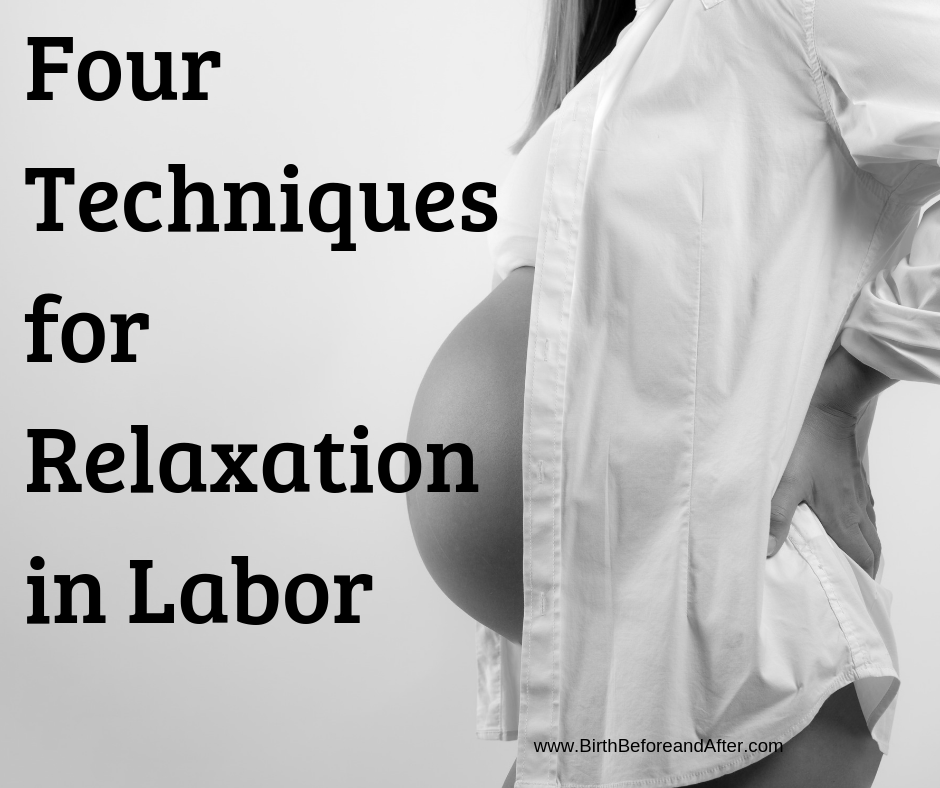Relaxation techniques are one of the most important items to place in your "toolkit for labor". There are many different types of relaxation and ways to go about them. Here are four of the most commonly used techniques and an example of each to practice. For more information on relaxation techniques and other items for your labor toolkit, look into a childbirth education class.
Focused relaxation
Focused relaxation involves tightening and then systematically relaxing your muscles. Start by tensing your muscles. Hold those muscles for 5-10 seconds and then let go. Now work through your body specifically relaxing each muscle again.
Focused relaxation example:
Practice this exercise often and use it when you feel yourself experiencing stress during everyday life. This is a wonderful relaxation technique for early to active labor to help you relax during contractions.
Focused relaxation example:
- Get into a comfortable position, either laying down or sitting supported in a chair where your entire body can relax including your head.
- Start by tightening your muscles. Feel your jaw and neck tight. Feel your arms, hands, and fingers tight. Feel your stomach tighten. Tighten your legs all the way down to your toes.
- Squeeze them tighter and hold for a count of 5.
- Now breathe out and relax.
- Now work through your body to relax each muscle in your body.
- Relax your face.
- Make sure your jaw is relaxed. Your mouth can be slightly open if it is comfortable.
- Relax your neck letting your head sink into your chair/bed.
- Relax your shoulders, arms, hands and fingers.
- Continue working down your body taking slow deep breaths.
- Relax your abdomen.
- Relax your legs and feet moving them to the most comfortable position for you.
Practice this exercise often and use it when you feel yourself experiencing stress during everyday life. This is a wonderful relaxation technique for early to active labor to help you relax during contractions.
Internal focus
This relaxation technique brings your focus inward. You will make note of every sensation your body feels. While this may seem counterintuitive for labor, this relaxation technique can be very soothing.
Inward focus example:
Practice this technique to determine if you enjoy it. It will also help you discover your most comfortable positions for relaxation. Use this technique especially during times of transition or movement.
Inward focus example:
- Start in a comfortable and supported position.
- Close your eyes.
- Take 3-4 deep breathes.
- Now begin to focus inward.
- Are there sheet or blankets touching your skin? What do they feel like? Smooth, rough, silky, fluffy?
- What parts of your body are supported by your chair/bed? Exactly where do you feel the contact with your body on the furniture? Do you want to adjust for a more comfortable feel?
- Where do you have clothing? What does each item feel like? Are there tags or creases that you would like to adjust?
- Do you have jewelry or accessories? A ring, earrings, watch, or necklace? Do they feel cool and comforting? Tight and restricting? Feel free to adjust or remove them.
- Focus even further inward? Feel your breathing? Where does your body move when you breath in? How does the air feel when it leaves your body? Try breathing out through your mouth or nose. Which do you prefer?
- Feel your heartbeat.
- Feel your baby's movement.
- Notice the pressure you may feel in your body.
Practice this technique to determine if you enjoy it. It will also help you discover your most comfortable positions for relaxation. Use this technique especially during times of transition or movement.
External focus
In this style of relaxation, you'll focus on everything you hear and see externally or outside of your body.
External focus example:
Start by sitting or laying in a comfortable position. You may find it easier to begin practicing this technique with your eyes closed.
Take a few deep breathes.
Start to listen to your surroundings. What are those sounds you usually block out? Try to just hear the sounds without placing judgement on them. This is not the time to be upset about the door slam. It's a time to focus, hear, and acknowledge each and every sound.
Do you hear talking? Is it live or from the TV/computer?
Can you hear sounds from outside? Animals, cars, planes, etc?
What smaller, farther away sounds might you hear if you focus?
Is there water running?
Can you hear typing or someone preparing food? What exactly does that sound like?
Are there children playing? Can you tell what they are playing with by listening?
Do you have music you enjoy? This would be a time to try different types of music to see which may relax you or take you away.
Do you enjoy hearing others speak? Do you prefer quiet? Do you enjoy soothing sounds like water?
Continue to try different sounds and listen to the sounds around you.
Practice this in other situations as well. If you are a passenger in the car you can practice listening to all the sounds as you pass by various places. If your eyes are closed, can you tell where you are by listening to the sounds?
This is a wonderful relaxation technique for early labor to pull your thoughts away from the feelings in your body if they cause anxiety or stress. You can use external focus, as you transition from different places during your labor. Some people find utilizing external focus at the birthing location to adjust to the new environment.
External focus example:
Start by sitting or laying in a comfortable position. You may find it easier to begin practicing this technique with your eyes closed.
Take a few deep breathes.
Start to listen to your surroundings. What are those sounds you usually block out? Try to just hear the sounds without placing judgement on them. This is not the time to be upset about the door slam. It's a time to focus, hear, and acknowledge each and every sound.
Do you hear talking? Is it live or from the TV/computer?
Can you hear sounds from outside? Animals, cars, planes, etc?
What smaller, farther away sounds might you hear if you focus?
Is there water running?
Can you hear typing or someone preparing food? What exactly does that sound like?
Are there children playing? Can you tell what they are playing with by listening?
Do you have music you enjoy? This would be a time to try different types of music to see which may relax you or take you away.
Do you enjoy hearing others speak? Do you prefer quiet? Do you enjoy soothing sounds like water?
Continue to try different sounds and listen to the sounds around you.
Practice this in other situations as well. If you are a passenger in the car you can practice listening to all the sounds as you pass by various places. If your eyes are closed, can you tell where you are by listening to the sounds?
This is a wonderful relaxation technique for early labor to pull your thoughts away from the feelings in your body if they cause anxiety or stress. You can use external focus, as you transition from different places during your labor. Some people find utilizing external focus at the birthing location to adjust to the new environment.
Rhythmic breathing
Rhythmic or practiced breathing is what most people think about from Lamaze or other birthing classes. While heavy patterned breathing usually is not effective, slower, more steady breathing can be of benefit both during labor or any other times of stress.
Rhythmic breathing example:
Use this breathing at any point during labor or any other stressful times. The slow and focused breathing can help you relax and slow your heart rate.
Rhythmic breathing example:
- We did start with a very simple breathing technique.
- Get in a comfortable and supported position.
- Close your eyes if you like.
- Take some deep, cleansing breaths.
- Now take a slow breath in through your mouth to a count of 3.
- Now hold that breath (if you can comfortablely) to a count of 3.
- Now breath out through your mouth to a count of 3.
- Is that comfortable?
- Some people prefer a count of 4 or 5 but chose a count that is comfortable to you.
- Try breathing all the way down into your abdomen, holding, and then blowing all the air out.
- Work to keep your breathing and counts slow and steady.
- A partner can count with you if you find it helpful.
Use this breathing at any point during labor or any other stressful times. The slow and focused breathing can help you relax and slow your heart rate.
Spend time practicing various relaxation techniques before your labor starts. Use them any time you are stressed or are experiencing pain. The more comfortable you are with a technique the more likely you are to remember to use it and have it be effective during labor.
Looking for other suggestions to help you cope and progress in labor? Consider Not Your Mama's Childbirth Class.
Looking for other suggestions to help you cope and progress in labor? Consider Not Your Mama's Childbirth Class.









 RSS Feed
RSS Feed
